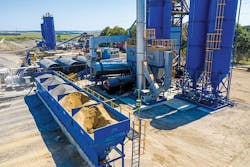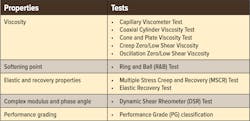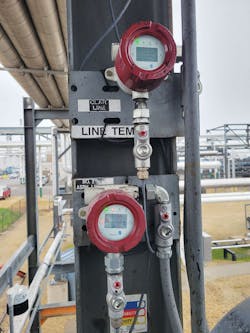Meeting rigorous quality control of asphalt with real-time viscosity measurements
By: Manpreet Dash, Joe Goodbread, Ph.D., Sunil Kumar, Ph.D., and Vijoya Sa, Ph.D.
Asphalt has proven itself to be one of the most versatile and effective materials for paving.
Ensuring that asphalt meets regulatory norms like ASTM, AASHTO, DIN, and EN—while reducing emissions related to its production and use—is a win-win. Real-time in-line viscosity monitoring and control of asphalt from production in refineries to final loading at the terminal for transport to the paving site improves bottom-line and protects personnel. Cost reduction and safety improvements are achieved through optimizing the use of solvents & modifiers to achieve fit-for-purpose asphalt mixture. The measuring process creates zero emissions and can be done completely in-line without need for off-line grab samples. A resonant sensor based in-line viscometer takes viscosity measurements into the digital world in tune with modern road design and enables real-time management of bitumen properties across the complete asphalt life cycle.
Application
The two main parameters of polymer blended bitumen for the production of hot mix asphalt (HMA) are viscosity and temperature. Asphalt-cement viscosity describes resistance to compaction of paving mixture. Using viscosity measurements in pipes and tanks, engineers can ensure that the quality control parameters are adhered to and the product is within specifications. An in-line viscosity measurement could be used as a process feedback variable in an automatic blending control system to regulate the temperature, mixing time, and addition of performance-enhancing additives.
For asphalt mixing and transportation operations, viscosity data provides more meaningful insights when collected and analyzed over time. Data analysis helps process engineers diagnose quality issues. Operators can schedule maintenance and make necessary upgrades to their equipment to improve reliability and efficiency.
Stages in the asphalt ecosystem where viscosity measurements bring value
There are two separate stages in the life of every hot-mix asphalt pavement. The construction stage from cold aggregate feed and asphalt storage to finished pavement. The properties of bitumen change as it ages in bulk storage, transport, and storage on-site. The change in bitumen properties needs to be monitored and suitable corrective actions undertaken across the value chain to ensure correct properties prior to application.
Viscosity as a tool for R&D: New asphalt-mix development and improvement studies
Viscosity is a property that is affected at the molecular level and has tremendous amounts of information about the process and the fluid behavior. The addition of viscosity modifiers to create high-viscosity modified asphalt pavement has proved to have a strong ability to resist shear flow and deformation, strong bonding strength, and increased low-temperature performance of the material. The quantity and types of addition need to be fine-tuned, and viscosity measurements are key elements of conducting R&D, experimentation, and asphalt characterization studies. The temperature-viscosity relationship is important when determining the performance parameters such as adhesion, rheology, durability, and application temperature of bitumen. Therefore, accurate viscosity analysis of bitumen at different temperatures has become an important test.
Viscosity of asphalt binder at high temperatures is important because it affects the following:
- Pumpability. The ability of the asphalt binder to be pumped between storage facilities and into the HMA manufacturing plant.
- Mixability. The ability of the asphalt binder to be properly mixed with and to coat aggregate and other HMA constituents in the HMA manufacturing plant.
- Workability. The ability of the resultant HMA to be placed and compacted with reasonable effort.
Density information critical to paving troubleshooting and to avoid paving problems
Long-term pavement performance is the result of the smoothness and mat quality of the HMA mixture. Smoothness affects the transportation costs of the road user and directly influences vehicle maintenance costs, fuel consumption, speed, passenger comfort, safety, and vehicle noise. Poor mat quality also affects the pavement performance and may be caused by cracks, segregation, poor joints, and other defects. Furthermore, low density may cause the mix to deform, make the mix more susceptible to moisture, prematurely harden the asphalt, decrease the fatigue resistance, or reduce the structural strength of the pavement. Possible problems with inadequate density management in paving operations are:
- Non-uniformity in the HMA mix
- Thickness and mat quality variations
- Mat shoving ahead of roller
- Unsatisfactory compaction
Typical test methods for characterizing bitumen-relevant properties and impact on resistance to rutting
Usage of modified asphalt binders has been on the rise. As a result, additives such as polymers, rubbers, acids, and oils have been used for asphalt modification. Performance properties of asphalt binders such as resistance against high-temperature rutting have been significantly increased due to modification of the asphalt binder.
There are many different components of asphalt that help define its behavior and functions. Viscosity, complex shear modulus, and stiffness are among those components that are especially important when trying to understand the behavior of asphalt. There are many identified correlations between bitumen relevant properties and the resistance to permanent deformation of bituminous mixtures. The bitumen properties and the associated tests are presented in Table 2.
Measurements for rheological asphalt binder specifications correspond to international standards such as ASTM, AASHTO, DIN, EN, CEN/TS, IS, GOST, and SATS. For characterizing the high-temperature performance of modified asphalt binders, many transportation agencies use AASHTO (American Association of Highway and Transportation Officials) standards and grading systems for conducting the tests.
How viscosity measurements can be made and reliably put to use
In-line/online viscometers measure directly the viscosity of material in a tank or pipe while it is in use, providing real-time data. They are a suitable alternative to time-consuming lab procedures and tedious measurements management, even with experienced operators. The actual cost-of-operation may be significantly less than with benchtop viscometers.
The vibrational viscometer is a popular in-line viscosity measurement instrument that does not involve moving parts. The principal advantage of these instruments is the measurement of continuous viscosity at operating temperatures. Although sensitive to changes in viscosity, this type of instrument is insensitive to changes in binder flow rate and vibration. It is designed to operate in harsh environments of an asphalt plant. It can effectively monitor and control the modified asphalt binders process to ensure that the asphalt output is always consistent even with raw material variability.
The real opportunity is to look beyond the basic requirements and use viscosity data in a timely manner to ensure consistent asphalt quality throughout the life cycle. Using such binder will ensure reliable performance when placing asphalt on the ground. In-line viscosity measurement allows for conformance with required standards like AASHTO M332 MSCR grading system and AASHTO T-350 MSCR test procedure, which are widely adopted by transportation agencies.
Asphalt 4.0: Staying ahead of problems by using data and digitalization
Customer specifications vary with region, since roads are subject to radically different environments. The raw material for making asphalt is basically the leftover items in the crude oil barrel after high value products have been extracted or refined. That material can be very non-homogenous, and can vary radically in makeup from barrel to barrel depending on the source of the crude.
Temperature and humidity variations, mixing equipment condition, formulations, line-integration, machine interactions, and time of mixing are some of the many parameters which can alter the produced asphalt-mix quality across batches. Technologies required to assist repeatable operations despite so many influencing factors now exist. Once the manufacturer invests in process monitoring equipment, the current industrial control systems are well developed to be able to use the viscosity data from the processes to standardize operations and quality.
The key value drivers of the asphalt industry embracing real-time in-line viscosity monitoring equipment are the following:
- Real-time monitoring to achieve consistent quality of delivery. Any deviation can be quickly caught and corrected without wasting a full load or worse, creating future issues with road or roof. Traceable quality assurance gives higher producer confidence and reduces liability arising from quality complaints.
- Automated corrective actions for ensuring production efficiency and consistency. Closed control loops through sensor-based, in-line quality inspection reduces waste and increases yield through early process deviation detection, root cause analysis, and automatic correction for asphalt producers.
- Circular innovation: More agility in dealing with new asphalt-mix variants in production, compliance, and provenance. Fine unique asphalt grades are produced by refineries, each with a different viscosity that must meet a target specification. With in-line viscosity measurements, these producers get insights about of how the new formulations/compositions will behave and how they might need to adjust current blending systems and control parameters.
- Big data provides robust evidence to base decisions for greater efficiency. The data provided by the process monitoring equipment enables them to tweak various process parameters and optimize the production process. Interconnection and information transparency enables decentralization of decisions within and outside the production facilities.
- Higher quality standards and adapting to customer requests. The technology, data, and information that can help transform manufacturing operations can also make processes and systems more responsive to the end-user needs.
- Complete track and trace of production process. Real-time monitoring of asphalt production data enables track and trace of every step in the process chain, ensuring full compliance with both regulatory and agency requirements.
Accurate and responsive in-line viscosity measurement and control
Automated in-line viscosity measurement enables continuous monitoring of bitumen in production, transit, and at the point of application. It enables control of the viscosity to assure uniform quality across all stages. In-line viscosity management with the Rheonics SRV can help alleviate some of the most common paving issues due to inconsistent asphalt supply—cracks (longitudinal, transverse, alligator, slippage, edge), bleeding, tearing, waviness, potholes, depressions, rutting, upheaval, raveling, and shoving. Effective control of the viscosity of the asphalt leads to a significant improvement of the paving process by improving quality and reducing reworks.
Consistent product quality and control of blending can be accomplished by using the data from the sensor and integrating it in the production/blending control system. Data exported to the production control can be utilized to maintain the product within the defined specifications.
Value proposition for refineries:
- Better control over quality, and hence reduction in production variabilities
- Significant cost savings are achieved by bringing down the amount of diluent needed to achieve targeted specifications
- Improvements in reliability of operations and reduction in tankage requirements, associated energy, capital, and maintenance costs
- The measuring process creates zero emissions and can be done fully in-line without need for off-line measurements
- Increased throughput with less investment in inventory and capital equipment
Since the beginning of asphalt technology, viscosity has been used to classify bitumen and predict asphalt properties. The measuring methods, however, have not kept up with the times. They are slow, laborious, and solvent dependent. Modern viscometers excel from a practical and environmental perspective, as well as from a cost perspective. Due to the complexity of asphalt melts and asphalt emulsions as fluids, typical lab instruments are expensive and cumbersome. There is a need for better, simpler instrumentation in the industry.
In addition to meeting the need for high temperature viscosity measurement and real-time data collection, the in-line viscometer system’s self-cleaning design enables the asphalt manufacturer to maintain the systems more efficiently, without constant maintenance and recalibration. Road pavement industries highlight huge CO2 savings, which can be potentially achieved with top built quality of roads.
About The Author: Dash is part of the Application Engineering and Markets Development team at Rheonics. Goodbread is Chief Technology Officer of Rheonics. Kumar is CEO of Rheonics. Sa leads the Application Engineering & Technical Sales team at Rheonics.









